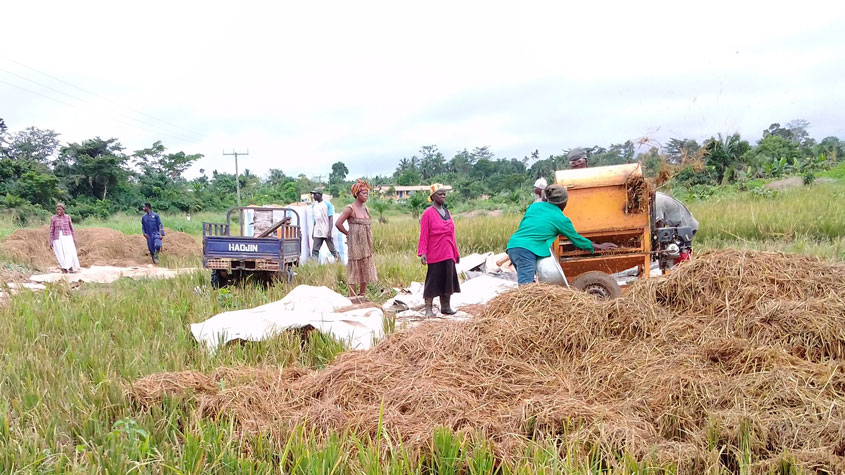Improving livelihoods with game-changing rice harvesting technology
Small-scale rice farmers in Ghana face a lack of farming equipment and machine infrastructure. Recognizing the need for more effective harvesting equipment, young entrepreneur John Wobil has developed a Multi-Stage Rice Thresher that enables farmers in Ghana’s Adansi Asarekrom region to harvest their crops more effectively. His invention is strengthening food security across the region by offering more than 220 local smallholders a more efficient rice threshing technique that is improving harvest yields and their livelihoods.

In 2020, Ghana produced 973,000 tons of rice. Estimates suggest that for some 40 percent of the country’s smallholders, rice production is their primary source of income. These smallholders typically use traditional farming methods resulting in significant post-harvest losses and serious implications for their livelihood security.
“The Ghanaian agricultural ecosystem is rife with Adam and Eve farming, that is, the use of traditional farming methods that reduce productivity, delay farming activities and mostly lead to extreme post-harvest losses," explains John Wobil, co-founder of Wobil Technologies Limited. Wobil is committed to transforming the agricultural sector in his region through the development of agricultural technology.
Growing up in a rural Ghana, Wobil witnessed firsthand, the challenges associated with traditional rice threshing. “It is a backbreaking, gender-unfriendly and time-consuming process,” he says. "Since I was a child, I watched my parents and other farmers perform traditional farming activities, especially rice threshing, which is a slow, laborious process that puts a brake on productivity. At the time, they didn’t know of a better solution to improve this process," he explains.
In 2019, in a bid to offer local farmers a more efficient and less labor-intensive solution, Wobil teamed up with his brother Gabriel to create a wooden rice thresher. "We developed a wooden rice thresher and used it to service more than 50 small rice farmers in the region, and with that thresher we processed 26 tons of rice, with a threshing capacity of 125 to 350 kilograms per hour," he explains.
Although the wooden rice thresher’s performance was slower than expected, the brothers were encouraged by the farmers’ response and their evident willingness to pay to use their invention. This prompted them to refine their invention further and to come up with their high performance Multi-Stage Rice Thresher, which they launched in 2021.
The new Multi-Stage Rice Thresher offers a better winnowing capacity than the wooden rice thresher, breaking less than 0.3 percent of the grains even at high speed. It is also easier to transport. "Our Multi-Stage Rice Thresher threshes 750 to 1300 kilograms per hour. It reduces rice losses and has serviced over 220 smallholder rice farmers," Wobil explains, noting that the Multi-Stage Rice Thresher reduced post-harvest losses from 46.09 percent in 2021, to 11.26 percent in 2022.
The company now offers local rice farmers both the wood threshing machine and the Multi-Stage Rice Thresher.
Wobil believes that innovation and technology are crucial to increasing crop yields, improving the efficiency of farming processes, and maximizing economic gains for local farmers. “I see an exciting future with advancing mechanization technologies that will positively impact people's lives, especially in the agricultural sector,” he says.
To date, Wobil Technologies has obtained financial assistance from two sources. This injection of funds is enabling the company to continue its work in developing agricultural machinery for local smallholders. "We obtained a grant from the Mastercard Foundation Scholars Program at the Kwame Nkrumah University of Science and Technology, and the money was used to fund the Multi-Stage Rice Thresher prototype and to purchase a tricycle to transport the machine to various rice farms," Wobil explains.
The company also benefitted financially from winning the 2022 Virtual Africa Regional Venture Challenge. These funds are supporting further development of their multi-stage rice thresher.
Thinking about IP for agri-technology

a high winnowing capacity and is easily transportable
by tricycle. To date, 220 small holders have benefited
from using it. (Photo: Courtesy of Wobil Technologies).
A lack of funding and resources to support startups in Ghana has been a big challenge for Wobil's entrepreneurial journey. "I wish I had met some business incubators when we set up the company as that would have provided me with tools and the means to improve the performance of our wooden rice thresher. It would have also helped us develop a better version of the Multi-Stage Rice Thresher," says Wobil, who is currently receiving business advice and technical support from the Center for Business Development (CBD) at the Kwame Nkrumah University of Science and Technology (KNUST), in Kumasi, Ghana.
Wobil explains that he knew nothing about intellectual property (IP) when he set about developing his technology. "I didn't know anything about IP. I shared my work with a potential external partner, who I thought could help, without taking any precautionary measures. I even showed them some technical features on my computer, which they could have stolen. I did so in confidence, but now I realize that a less risky approach would have been to protect my work with IP,” he says.
"I now ensure I acquire IP rights before releasing any technical information to the public. This allows me to prevent people from copying or reverse-engineering the technology I develop," he explains.